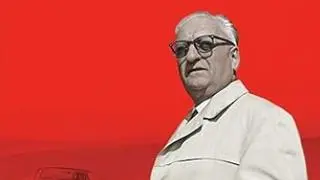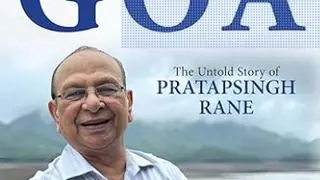On the face of it a sumptuous coffee table book running to 232 pages with glossily printed pages and a plethora of photographs, many of them in colour, might appear to be too opulent for a cricketer who played just eight Tests with a modest record.
But then Chingleput Doraikannu Gopinath was more than just that. Sure, his international record did not quite match his first-class record during a career in which he was a tower of strength for Madras and South Zone. But even a cursory glance at the well got up book will drive home the fact that Gopinath was much more than just a cricketer who represented India. He led an eventful life, full of enterprise and adventure.
A man of many facets and interests he has lived life to the full and happily at 93 is still with us. He is the only surviving member of the Indian team that notched up its first victory in Test cricket – against England at Chepauk in February 1952. It was Gopinath who took the final catch to dismiss Brian Statham off Vinoo Mankad that heralded India’s maiden Test victory. That ball is his prized possession.
His autobiography, written in collaboration with well-known writer and translator, V Ramnarayan, a former first-class cricketer, is a book that is a must for everyone who appreciates good literature. It is not just for the cricket follower for there are several chapters that will appeal to lovers of hunting, wild life, fishing, rowing and travel. Gopinath, a multi-dimensional personality, more than dabbled in all these pursuits even as he continued to be a successful businessman and chairman of Gordon Woodroffe, with which his name is indissolubly linked both for the durability of his association with the company and the manner in which he performed his duties, which earned him plaudits aplenty from his colleagues and business associates.
With candour and humour
The book is divided into two parts. Part I, in Ramnarayan’s words, wherein the writer extols Gopinath’s virtues as a cricketer, selector and as a person. As he says, “two things stand out throughout Gopinath’s life and career – the values of honesty and ethics he imbibed from his parents and the ability to forge lifelong friendships.’’ Part II, in Gopinath’s words, has him relating events of his life as a cricketer and selector but of equal interest are accounts of his personal and professional life which he relates with great candour and humour. His long association with Gordon Woodroffe, his work in shipping, his efforts in pioneering containers through OCL and his adventures among wild life will garner a lot of attention for Gopinath is widely travelled. He also speaks quite candidly about his friends and family members and indeed they have their say on the Gopinaths, both CD and his charming wife, Comala.
The honours that have come Gopinath’s way is testimony to his standing in society as an erudite, endearing and upright personality. He became chairman of Gordon Woodroffe in 1971 - the first Indian to take over the running of the 120-year-old British company. He also served as honorary consul for Norway. In 1976-77 he was the sheriff of Madras. He also served as deputy chairman of ASSOCHAM.
An accomplished hunter, Gopinath writes candidly about his adventures the world over and the close encounters he has had with tigers, leopards, and elephants. Of particular interest is the chapter, African Safari. As he says, “I have spent many hours observing animals and birds and have been amazed at their intelligence and the manner in which they capture their prey. I always tell people don’t ever say `bird brain.’ Birds seem to have more grey cells than many of us.’’ Later in life he took to fishing and he tells us about the joys of angling and how he and Comala have fished all over the world ”from Alaska for salmon to Mauritius for marlin and Lake Victoria in Africa for Nile Perch and New Zealand and Kashmir for trout.’’
According to Gopinath, “My cardinal rule in life is never to judge anyone – even if I find the actions of some people perplexing – without knowing the circumstances and the pressure that forced them to act in that manner.’’ He also speaks about his firm belief in destiny. “I am convinced that the life of every individual is pre-ordained. No one can change his life from what is already set for him and no amount of effort can change whatever is pre-ordained for him.’’ These attitudes have stood him in good stead both during his cricketing and professional career.
Pulling no punches
For a batsman who scored 4,259 runs at an average of 42 with nine hundreds in his first-classcareer, figures of 242 runs in eight Tests at an average of 22 with just one half-century might appear short. Gopinath combined style and substance but the fact remains that he could not command a regular place in the Indian team of the 50s in the face of intense competition. But there are other reasons too for his fragmented Test career and Gopinath pulls no punches in talking about them. He blames Vijay Hazare, the captain of the 1952 tour of England, for treating him shabbily following a misunderstanding. Thereon he says he was always going in at No 8 and so got virtually no opportunities to showcase his batting. So serious was the misunderstanding that Gopinath withdrew from the team to tour West Indies the following year when he came to know that Hazare was again the captain.
In the Ranji Trophy, Gopinath remained a heavy run-getter finishing with 2,349 runs at an average of 51 with a highest score of 234 against Mysore even though he had a comparatively short first-class career – just about a dozen years - due to business commitments. But more than the impressive figures it was his elegant batsmanship that caught the eye. A cultivated stylist, Gopinath was an elegant right-hander who charmed the ball away from the fielders. He played pace and spin with equal felicity and old-timers still recall his majestic 175 made for South Zone against the New Zealanders on their 1955-56 visit.
After his playing career was over Gopinath kept in close touch with the game. First, he had nine straight terms from 1968-69 to 1976-77 on the selection committee, the last five of them as chairman. In 1979, he managed the Indian team to England. As an elder statesman, Gopinath has remained graciously affable and polished in his behaviour while spending much time on the tennis courts, the golf course and the bridge tables.










Comments
Comments have to be in English, and in full sentences. They cannot be abusive or personal. Please abide by our community guidelines for posting your comments.
We have migrated to a new commenting platform. If you are already a registered user of TheHindu Businessline and logged in, you may continue to engage with our articles. If you do not have an account please register and login to post comments. Users can access their older comments by logging into their accounts on Vuukle.